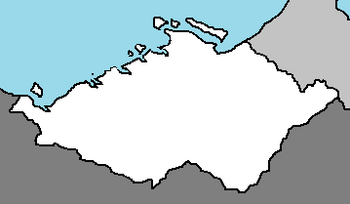Apatonia
Democratic Republic of the Apatonia République démocratique du Apatolia | |
|---|---|
|
Flag | |
| Motto: "Justice – Peace – Work" | |
 | |
| Capital | Sifondo |
| Largest city | Misamba |
| Official languages | Apatonian |
| Recognised national languages | |
| Religion (2015) |
|
| Demonym(s) | Apatonian |
| Government | Unitary semi-presidential constitutional republic |
| James Etémé | |
• Prime Minister Abolished | Michel Lukonde (2018-2022)* |
• President of the Senate | Bahati Mawobo |
• President of the National Assembly | Christophe Mboso |
• President of the Constitutional Court | Mlamuli Majola |
| Legislature | Parliament |
| Senate | |
| National Assembly | |
| Formation | |
| 17 November 1879 | |
• Apatonia Free State | 1 July 1885 |
• Independence from Albarine | 30 June 1957 |
• Admitted to the CCA | 20 September 1988 |
| Area | |
• Total | 342,000 km2 (132,000 sq mi) (11th) |
• Water (%) | 3.32 |
| Population | |
• 2021 estimate | 21,386,000 |
| GDP (PPP) | 2019 estimate |
• Total | |
• Per capita | |
| GDP (nominal) | 2019 estimate |
• Total | |
• Per capita | |
| Gini (2012) | medium |
| HDI (2019) | low |
| Currency | coani (CDF) |
| Time zone | UTC -7 |
| Date format | dd/mm/yyyy |
| Driving side | right |
| Calling code | +243 |
| Internet TLD | .an |
Apatonia, officially known as the Democratic Republic of the Apatonia or the DRA, is a nation in Southern Adula, bordered to the north by Unified Sera and Thezu. With a population of over 21.3 million varying ethnic backgrounds, it is one of the most diversely populated nations in the world both in terms of race and religion. While most of the nation is composed of Christian faiths, there are widespread traditional beliefs and Islamic faiths intertwined. The capital city is Sifondo, while the largest city is the port of Misamba. Since 2017, the southeast has been the site of an ongoing military conflict in Biulundo which has seen involvement of CCA peacekeepers and has been referred to as the Apatonia Civil War. With the ouster of Mlamuli Ngotsha and the exile of Michel Lukonde in 2022, James Etémé was elected President.
Centered on the Apaton River Basin, the territory of the DRA was first inhabited by South Adulan foragers around 90,000 years ago and was reached by the Albarinean expansion about 3,000 years ago. In the west, the Kingdom of Londo ruled around the mouth of the Londo River from the 14th to 19th centuries. In the northeast, center and east, the kingdoms of Aezde, Tuba and Tunda ruled from the 16th and 17th centuries to the 19th century. In the 1870s, just after the end of the Barretoan Wars, exploration of the Apaton Basin was carried out, first led by Tacito Saraiva under the sponsorship of Albarine. Albarine formally acquired rights to the territory at the Saint Marina Conference in 1885 and declared the land its sovereign territory, naming it the Apatonia Free State. During the Free State period, colonial military units forced the local population to produce rubber. From 1885 to 1929, millions of people died as a consequence of disease and exploitation. The territory gained independence from Albarine following the World War on June 30th, 1957. A deadly war raged with neighboring Thezu from 1957 until 1979, resulting in the deaths of more than 3 million people and severely damaging the country's population, infrastructure, and functional capability. Despite this, the international community began to invest in Apatonia, and it joined the Coalition of Crown Albatross in 1988. Apatonia has seen free and open elections since 1986, with the most recent being in 2018 when the country elected President Mlamuli Ngotsha and Prime Minister Michel Lukonde.
The Democratic Republic of Apatonia is extremely rich in natural resources but has suffered from political instability, a lack of infrastructure, corruption, and centuries of both commercial and colonial extraction and exploitation with little widespread development. Besides the capital Sifondo and the port cities, the two next largest cities, Boteke and Wabi, are both mining communities. The DRA's largest export is raw minerals, with Yuan accepting over 50% of its exports in 2012. In 2019, DR Apatonia's level of human development was ranked low and as of 2018 around 300,000 Apatonians have fled to neighbouring countries from conflicts in the center and east of the DRA. Two million children risk starvation, and the fighting has displaced 3.5 million people.
